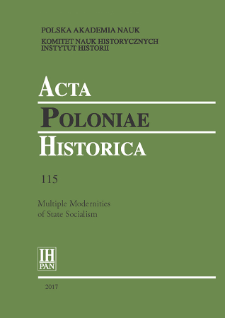- Wyszukaj w całym Repozytorium
- Piśmiennictwo i mapy
- Archeologia
- Baza Młynów
- Nauki przyrodnicze
Wyszukiwanie zaawansowane
Wyszukiwanie zaawansowane
Wyszukiwanie zaawansowane
Wyszukiwanie zaawansowane
Wyszukiwanie zaawansowane

Obiekt
Tytuł: The rubber waistband and the resistor: Solidarity Radio and media fantasies of emancipation under late socialism in Poland
Inny tytuł:
Acta Poloniae Historica T. 115 (2017)
Współtwórca:
Instytut Historii Polskiej Akademii Nauk ; Komitet Nauk Historycznych Polskiej Akademii Nauk
Wydawca:
Miejsce wydania:
Opis:
Typ obiektu:
Abstrakt:
The article presents the story of the underground Solidarity radio, a less known chapter of dissident media activism, whose emblematic form was the “extra-Gutenberg” phenomenon of underground print culture, or samizdat. It proposes an approach, influenced by media archeology, in which both can be studied as part and parcel of the same communication environment in order to better understand the particular articulation of dissent, media and modernity which both represented. It proposes that in addition to being a certain media form, samizdat was a “social media fantasy” – a shared cultural matrix which embodied political expectations and passions about liberating effects on horizontal communication, attainable here and now through means at disposal of an average person. Underground broadcasting developed in the shadow of the samizdat materialization of this emancipatory media fantasy, despite the fact that radio activists mastered a unique craft of intrusion into the public airwaves, which gave broadcasting an aura of spectacularity that underground publishing had lost as it expanded.
Bibliografia:
Bolter Jay D. and Grusin Richard, Remediation: Understanding New Media (Cambridge, MA, 2000).
Dunbar-Hester Christina, Low Power to the People: Pirates, Protest and Politics in FM Radio Activism (Cambridge, MA, 2014).
Huhtamo Erkki and Parikka Jussi (eds.), Media Archaeology: Approaches, Applications and Implications (Berkeley, 2011).
Kamiński Łukasz and Waligóra Grzegorz (eds.), NSZZ ‘Solidarność’ 1980-1989, ii: Ruch Społeczny (Warszawa, 2010).
Kind-Kovács Friederike and Labov Jessie (eds.),Samizdat, Tamizdat and Beyond: Transnational Media During and After Socialism (New York, 2013).
Komaromi Ann, ‘Samizdat as Extra-Gutenberg Phenomenon’, Poetics Today, xxix, 4 (2008), 29-67.
Natale Simone and Balbi Gabriele, ‘Media and the Imaginary in History’, Media History, xx, 2 (2014), 203-18.
Parisi Valentina (ed.), Samizdat: Between Practices and Representations (Budapest, 2015).
Pickard Victor, America’s Battle for Media Democracy: The Triumph of Corporate Libertarianism and the Future of Media Reform (Cambridge, MA, 2014).
Standage Tom, Writing on the Wall: Social Media - The First 2000 Years (New York, 2013).
Czasopismo/Seria/cykl:
Tom:
Strona pocz.:
Strona końc.:
Szczegółowy typ zasobu:
Format:
Identyfikator zasobu:
oai:rcin.org.pl:63834 ; 0001-6829 ; 10.12775/APH.2017.115.07
Źródło:
IH PAN, sygn. A.295/115 Podr. ; IH PAN, sygn. A.296/115 ; kliknij tutaj, żeby przejść
Język:
Prawa:
Licencja Creative Commons Uznanie autorstwa-Bez utworów zależnych 4.0
Zasady wykorzystania:
Zasób chroniony prawem autorskim. [CC BY-ND 4.0 Międzynarodowe] Korzystanie dozwolone zgodnie z licencją Creative Commons Uznanie autorstwa-Bez utworów zależnych 4.0, której pełne postanowienia dostępne są pod adresem: ; -
Digitalizacja:
Instytut Historii Polskiej Akademii Nauk
Lokalizacja oryginału:
Biblioteka Instytutu Historii PAN
Dostęp:
Kolekcje, do których przypisany jest obiekt:
- Repozytorium Cyfrowe Instytutów Naukowych > Kolekcje Partnerów > Instytut Historii PAN > Czasopisma
- Repozytorium Cyfrowe Instytutów Naukowych > Kolekcje Partnerów > Instytut Historii PAN > Wydawnictwa Instytutu
- Repozytorium Cyfrowe Instytutów Naukowych > Kolekcje Partnerów > Instytut Historii PAN > Wydawnictwa Instytutu > Czasopisma
- Repozytorium Cyfrowe Instytutów Naukowych > Kolekcje Partnerów > Instytut Historii PAN > Wydawnictwa Instytutu > Czasopisma > Acta Poloniae Historica
- Repozytorium Cyfrowe Instytutów Naukowych > Piśmiennictwo > Czasopisma/Artykuły
Data ostatniej modyfikacji:
22 wrz 2023
Data dodania obiektu:
29 lis 2017
Liczba pobrań / odtworzeń:
352
Wszystkie dostępne wersje tego obiektu:
https://rcin.org.pl./publication/83488
Wyświetl opis w formacie RDF:
Wyświetl opis w formacie RDFa:
Wyświetl opis w formacie OAI-PMH:
Obiekty Podobne
Byszewski, Piotr
Apanowicz, Franciszek
Apanowicz, Franciszek Wosik, Jakub Jaros, Maja

 INSTYTUT ARCHEOLOGII I ETNOLOGII POLSKIEJ AKADEMII NAUK
INSTYTUT ARCHEOLOGII I ETNOLOGII POLSKIEJ AKADEMII NAUK
 INSTYTUT BADAŃ LITERACKICH POLSKIEJ AKADEMII NAUK
INSTYTUT BADAŃ LITERACKICH POLSKIEJ AKADEMII NAUK
 INSTYTUT BADAWCZY LEŚNICTWA
INSTYTUT BADAWCZY LEŚNICTWA
 INSTYTUT BIOLOGII DOŚWIADCZALNEJ IM. MARCELEGO NENCKIEGO POLSKIEJ AKADEMII NAUK
INSTYTUT BIOLOGII DOŚWIADCZALNEJ IM. MARCELEGO NENCKIEGO POLSKIEJ AKADEMII NAUK
 INSTYTUT BIOLOGII SSAKÓW POLSKIEJ AKADEMII NAUK
INSTYTUT BIOLOGII SSAKÓW POLSKIEJ AKADEMII NAUK
 INSTYTUT CHEMII FIZYCZNEJ PAN
INSTYTUT CHEMII FIZYCZNEJ PAN
 INSTYTUT CHEMII ORGANICZNEJ PAN
INSTYTUT CHEMII ORGANICZNEJ PAN
 INSTYTUT FILOZOFII I SOCJOLOGII PAN
INSTYTUT FILOZOFII I SOCJOLOGII PAN
 INSTYTUT GEOGRAFII I PRZESTRZENNEGO ZAGOSPODAROWANIA PAN
INSTYTUT GEOGRAFII I PRZESTRZENNEGO ZAGOSPODAROWANIA PAN
 INSTYTUT HISTORII im. TADEUSZA MANTEUFFLA POLSKIEJ AKADEMII NAUK
INSTYTUT HISTORII im. TADEUSZA MANTEUFFLA POLSKIEJ AKADEMII NAUK
 INSTYTUT JĘZYKA POLSKIEGO POLSKIEJ AKADEMII NAUK
INSTYTUT JĘZYKA POLSKIEGO POLSKIEJ AKADEMII NAUK
 INSTYTUT MATEMATYCZNY PAN
INSTYTUT MATEMATYCZNY PAN
 INSTYTUT MEDYCYNY DOŚWIADCZALNEJ I KLINICZNEJ IM.MIROSŁAWA MOSSAKOWSKIEGO POLSKIEJ AKADEMII NAUK
INSTYTUT MEDYCYNY DOŚWIADCZALNEJ I KLINICZNEJ IM.MIROSŁAWA MOSSAKOWSKIEGO POLSKIEJ AKADEMII NAUK
 INSTYTUT PODSTAWOWYCH PROBLEMÓW TECHNIKI PAN
INSTYTUT PODSTAWOWYCH PROBLEMÓW TECHNIKI PAN
 INSTYTUT SLAWISTYKI PAN
INSTYTUT SLAWISTYKI PAN
 SIEĆ BADAWCZA ŁUKASIEWICZ - INSTYTUT TECHNOLOGII MATERIAŁÓW ELEKTRONICZNYCH
SIEĆ BADAWCZA ŁUKASIEWICZ - INSTYTUT TECHNOLOGII MATERIAŁÓW ELEKTRONICZNYCH
 MUZEUM I INSTYTUT ZOOLOGII POLSKIEJ AKADEMII NAUK
MUZEUM I INSTYTUT ZOOLOGII POLSKIEJ AKADEMII NAUK
 INSTYTUT BADAŃ SYSTEMOWYCH PAN
INSTYTUT BADAŃ SYSTEMOWYCH PAN
 INSTYTUT BOTANIKI IM. WŁADYSŁAWA SZAFERA POLSKIEJ AKADEMII NAUK
INSTYTUT BOTANIKI IM. WŁADYSŁAWA SZAFERA POLSKIEJ AKADEMII NAUK


































